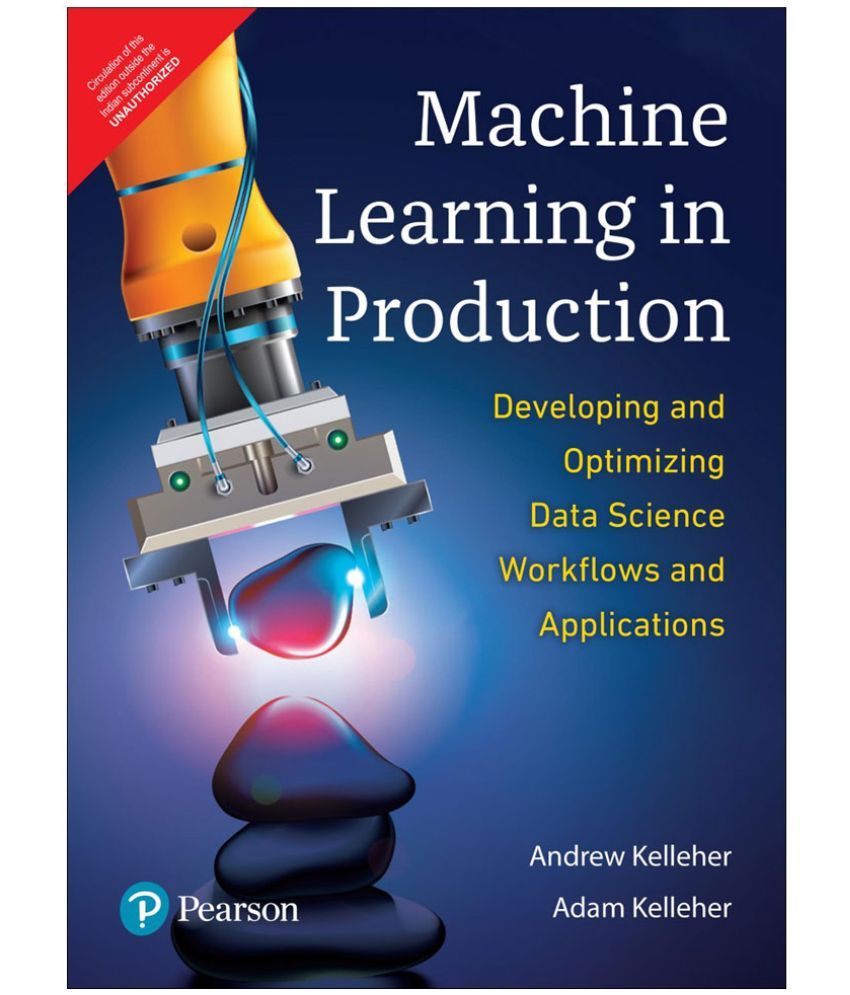Something went wrong. Please refresh the page and try again.
Something went wrong. Please refresh the page and try again.
Notifications can be turned off anytime from settings.
Item(s) Added To cart
Qty.
Something went wrong. Please refresh the page and try again.
Something went wrong. Please refresh the page and try again.
Exchange offer not applicable. New product price is lower than exchange product price
Please check the updated No Cost EMI details on the payment page
Exchange offer is not applicable with this product
Exchange Offer cannot be clubbed with Bajaj Finserv for this product
Product price & seller has been updated as per Bajaj Finserv EMI option
Please apply exchange offer again
Your item has been added to Shortlist.
View AllYour Item has been added to Shopping List
View AllSorry! Machine Learning in Production- Developing & Optimizing Data Science Workflows and Applications|First Edition|By Pearson is sold out.


You will be notified when this product will be in stock
| ||||||||||||||
Machine Learning in Production is a crash course in data science and machine learning for learners who need to solve real-world problems in production environments. Written for technically competent “accidental data scientists” with more curiosity and ambition than formal training, this complete and rigorous introduction stresses practice, not theory. Building on agile principles, Andrew and Adam Kelleher show how to quickly deliver significant value in production, resisting overhyped tools and unnecessary complexity. Drawing on their extensive experience, they help you ask useful questions and then execute production projects from start to finish. The authors show just how much information you can glean with straightforward queries, aggregations, and visualizations, and they teach indispensable error analysis methods to avoid costly mistakes. They turn to workhorse machine learning techniques such as linear regression, classification, clustering, and Bayesian inference, helping you choose the right algorithm for each production problem. Their concluding section on hardware, infrastructure, and distributed systems offers unique and invaluable guidance on optimization in production environments. They always focus on what matters in production: solving the problems that offer the highest return on investment, using the simplest, lowest-risk approaches that work.
Features:
1. Leverage agile principles to maximize development efficiency in production projects
2. Learn from practical Python code examples and visualizations that bring essential algorithmic concepts to life
3. Start with simple heuristics and improve them as your data pipeline matures
4. Communicate your results with basic data visualization techniques
5. Master basic machine learning techniques, starting with linear regression and random forests
6. Perform classification and clustering on both vector and graph data
7. Learn the basics of graphical models and Bayesian inference
8. Understand correlation and causation in machine learning models
9. Explore overfitting, model capacity, and other advanced machine learning techniques
10. Make informed architectural decisions about storage, data transfer, computation, and communication
Table of Contents:
Chapter 1: The Role of the Data Scientist
Chapter 2: Project Workflow
Chapter 3: Quantifying Error
Chapter 4: Data Encoding and Preprocessing
Chapter 5: Hypothesis Testing
Chapter 6: Data Visualization
Part II: Algorithms and Architectures
Chapter 7: Introduction to Algorithms and Architectures
Chapter 8: Comparison
Chapter 9: Regression
Chapter 10: Classification and Clustering
Chapter 11: Bayesian Networks
Chapter 12: Dimensional Reduction and Latent Variable Models
Chapter 13: Causal Inference
Chapter 14: Advanced Machine Learning
Part III: Bottlenecks and Optimizations
Chapter 15: Hardware Fundamentals
Chapter 16: Software Fundamentals
Chapter 17: Software Architecture
Chapter 18: The CAP Theorem
Chapter 19: Logical Network Topological Nodes
Author info:
1. Andrew Kelleher is a sta software engineer and distributed systems architect at Venmo. He was previously a sta software engineer at BuzzFeed and has worked on data pipelines and algorithm implementations for modern optimization. He graduated with a BS in physics from Clemson University. He runs a meetup in New York City that studies the fundamentals behind distributed systems in the context of production applications, and was ranked one of FastCompany’s most creative people two years in a row.
2. Adam Kelleher wrote this book while working as principal data scientist at BuzzFeed and adjunct professor at Columbia University in the City of New York. As of May 2018, he is chief data scientist for research at Barclays and teaches causal inference and machine learning products at Columbia. He graduated from Clemson University with a BS in physics, and has a PhD in cosmology from University of North Carolina at Chapel Hill.
The images represent actual product though color of the image and product may slightly differ.
Register now to get updates on promotions and
coupons. Or Download App